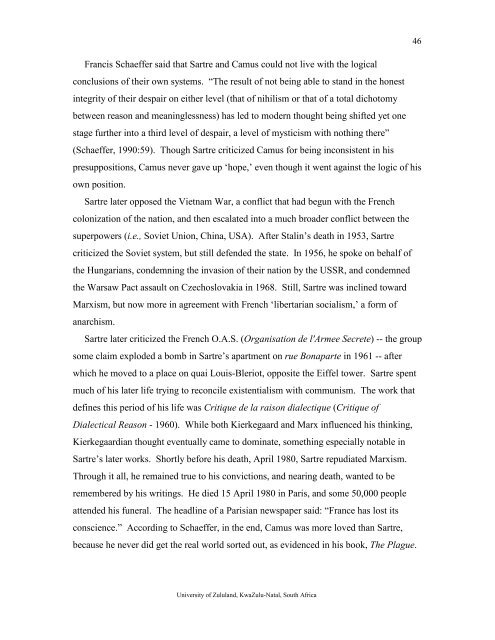Haase_UZ_x007E_DTh (2).pdf - South African Theological Seminary
Haase_UZ_x007E_DTh (2).pdf - South African Theological Seminary
Haase_UZ_x007E_DTh (2).pdf - South African Theological Seminary
Create successful ePaper yourself
Turn your PDF publications into a flip-book with our unique Google optimized e-Paper software.
46<br />
Francis Schaeffer said that Sartre and Camus could not live with the logical<br />
conclusions of their own systems. “The result of not being able to stand in the honest<br />
integrity of their despair on either level (that of nihilism or that of a total dichotomy<br />
between reason and meaninglessness) has led to modern thought being shifted yet one<br />
stage further into a third level of despair, a level of mysticism with nothing there”<br />
(Schaeffer, 1990:59). Though Sartre criticized Camus for being inconsistent in his<br />
presuppositions, Camus never gave up ‘hope,’ even though it went against the logic of his<br />
own position.<br />
Sartre later opposed the Vietnam War, a conflict that had begun with the French<br />
colonization of the nation, and then escalated into a much broader conflict between the<br />
superpowers (i.e., Soviet Union, China, USA). After Stalin’s death in 1953, Sartre<br />
criticized the Soviet system, but still defended the state. In 1956, he spoke on behalf of<br />
the Hungarians, condemning the invasion of their nation by the USSR, and condemned<br />
the Warsaw Pact assault on Czechoslovakia in 1968. Still, Sartre was inclined toward<br />
Marxism, but now more in agreement with French ‘libertarian socialism,’ a form of<br />
anarchism.<br />
Sartre later criticized the French O.A.S. (Organisation de l'Armee Secrete) -- the group<br />
some claim exploded a bomb in Sartre’s apartment on rue Bonaparte in 1961 -- after<br />
which he moved to a place on quai Louis-Bleriot, opposite the Eiffel tower. Sartre spent<br />
much of his later life trying to reconcile existentialism with communism. The work that<br />
defines this period of his life was Critique de la raison dialectique (Critique of<br />
Dialectical Reason - 1960). While both Kierkegaard and Marx influenced his thinking,<br />
Kierkegaardian thought eventually came to dominate, something especially notable in<br />
Sartre’s later works. Shortly before his death, April 1980, Sartre repudiated Marxism.<br />
Through it all, he remained true to his convictions, and nearing death, wanted to be<br />
remembered by his writings. He died 15 April 1980 in Paris, and some 50,000 people<br />
attended his funeral. The headline of a Parisian newspaper said: “France has lost its<br />
conscience.” According to Schaeffer, in the end, Camus was more loved than Sartre,<br />
because he never did get the real world sorted out, as evidenced in his book, The Plague.<br />
University of Zululand, KwaZulu-Natal, <strong>South</strong> Africa


















